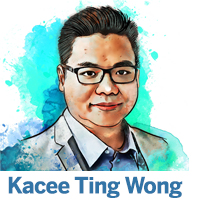The United States’ recent imposition of fresh sanctions on six Hong Kong Special Administrative Region and Chinese mainland officials — who are tasked with implementing the new national security regime in Hong Kong — is a farce. It is premised on the assumption that human rights must be defined according to US foreign policy and align with its national interests. Long gone are the days when the US claimed moral power in advancing its foreign policy. The new sanction action, which is part of the campaign to contain China’s development by undermining its international financial center, is tantamount to blatant interference in Hong Kong affairs, which are China’s internal affairs; the move is despicable and doomed to fail.
 Since the implementation of the National Security Law for Hong Kong (NSL) in June 2020, the US government and Congress have relentlessly attacked it under the usual pretext of promoting human rights, freedoms and democracy. The Trump administration adopted the Hong Kong Autonomy Act in July 2020 and introduced a series of measures, including imposing sanctions on officials involved in the enactment, adoption or implementation of the NSL. These sanctions have been described as the toughest yet, especially as individuals on the receiving end could face property seizures, asset freezes, and a ban on financial transactions associated with US banks.
Since the implementation of the National Security Law for Hong Kong (NSL) in June 2020, the US government and Congress have relentlessly attacked it under the usual pretext of promoting human rights, freedoms and democracy. The Trump administration adopted the Hong Kong Autonomy Act in July 2020 and introduced a series of measures, including imposing sanctions on officials involved in the enactment, adoption or implementation of the NSL. These sanctions have been described as the toughest yet, especially as individuals on the receiving end could face property seizures, asset freezes, and a ban on financial transactions associated with US banks.
To date, the US has sanctioned a total of 48 senior officials, including Chief Executive John Lee ka-chiu, for their role in implementing Hong Kong’s national security regime. It is worthy of note that Young Kim of the Republican Party and Jim McGovern of the Democratic Party introduced the Hong Kong Sanctions Act in January. They have sought to expand US sanctions to include members of the Hong Kong Judiciary for their roles in implementing national security laws in the city.
According to Willy Lam Wo-lap, a senior fellow at the Jamestown Foundation in Washington, Trump has not publicly placed much emphasis on “supporting human rights” in Hong Kong. It is just another card to play in the longstanding systemic competition with China, Lam was quoted as saying in a recent New York Times article. Lacking an altruistic intent to help those activists that Washington politicians claim to support, the Trump administration may just consider them as his chess pieces in the chess game with China.
In his memoir, John Bolton, who served as Trump’s third national security advisor in Trump’s first term, recalled that Trump was unwilling to press China on alleged human rights issues. The sharp criticism of Trump’s human rights records by the American Civil Liberties Union (ACLU) also merits our attention. The ACLU has pointed out that the new Trump administration aims to unilaterally undermine ratified human rights treaties that, under the American Constitution, are the law of the land, according to Jamil Dakwar, director of ACLU’s human rights program. Trump’s poor human rights record has reinforced my belief that Bolton’s accounts are highly credible. In view of the mismatch between the lofty justifications for sanctions and Trump’s apathetic attitude toward human right issues, Trump’s endorsement of any US sanctions against Hong Kong should be viewed through the lens of American national interests.
Contrary to the allegations made by the US, the promulgation of the NSL is necessary and reasonable. The restoration of social order allowed the HKSAR government to effectively implement COVID-19 prevention and control measures, and revitalize the economy. Hong Kong’s Judiciary is well-respected globally for its independent adjudication, competency and transparency, and Kim and McGovern’s move to seek sanctions on it exhibits their ill intention to vilify and undermine the administration of justice in the city. Jose-Antonio Maurellet, chairman of the Hong Kong Bar Association, demonstrated great courage in making a righteous call for legal associations worldwide to band together in opposing potential punitive measures against local judges and prosecutors. The Hong Kong absconders cited by the US Department of State in its sanctions statement are wanted not because they have exercised freedom of speech but because they have continued to engage in activities endangering China’s national security.
Meanwhile, the latest Hong Kong Policy Act Report is filled with lies and fallacies that merely serve Washington’s geopolitical agenda against China; they are far detached from the realities on the ground in Hong Kong.
The US’ smear campaign against Hong Kong and China as a whole cannot help Washington reclaim its lost moral high ground. It seems that the Trump administration merely wants to play the “sanctions card” to strengthen his bargaining power in negotiating a favorable trade deal with China and advance his “Make America Great Again” ambition.
The author is a barrister, part-time researcher of Shenzhen University Hong Kong and Macao Basic Law Research Center, chairman of the Chinese Dream Think Tank and a Hong Kong district councilor.
The views do not necessarily reflect those of China Daily.


